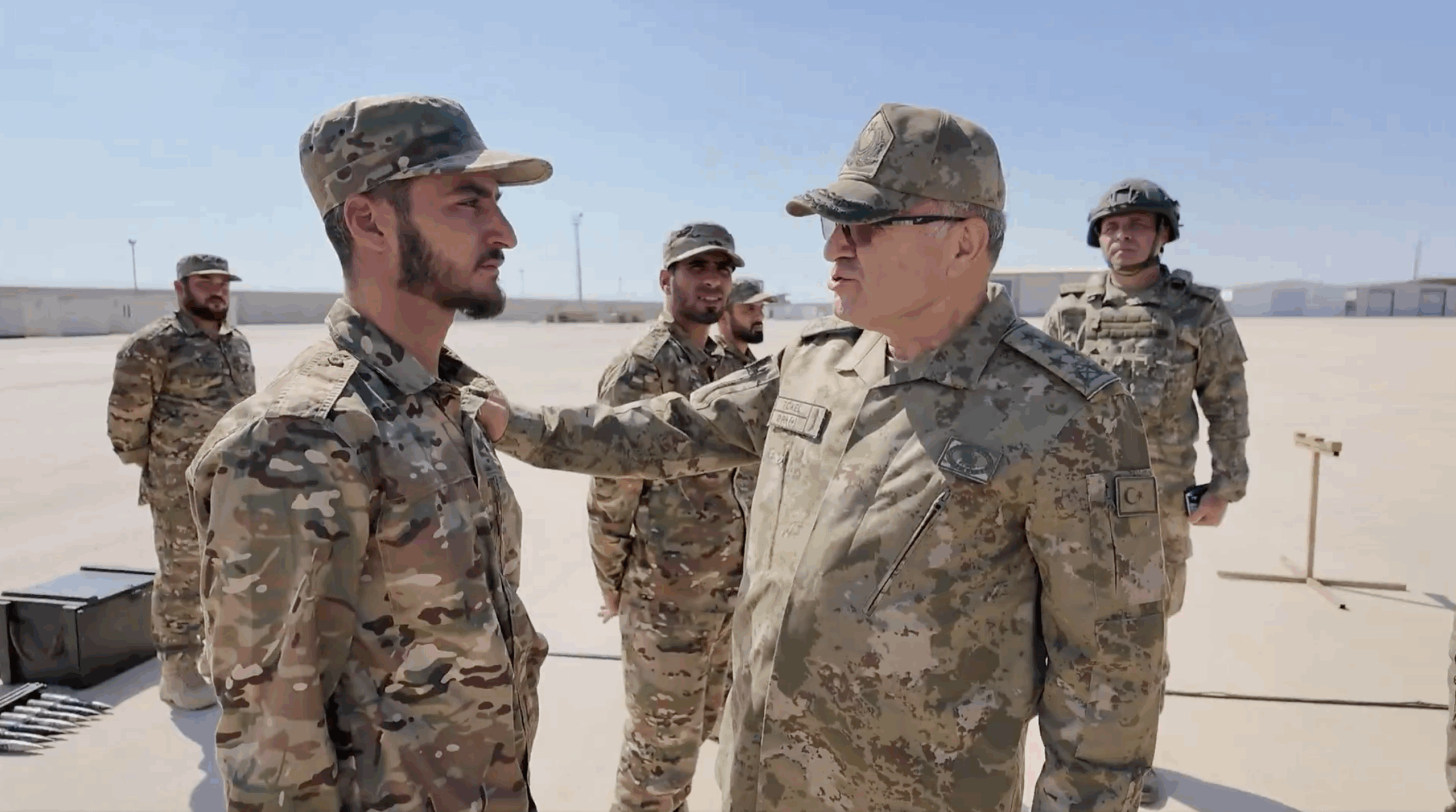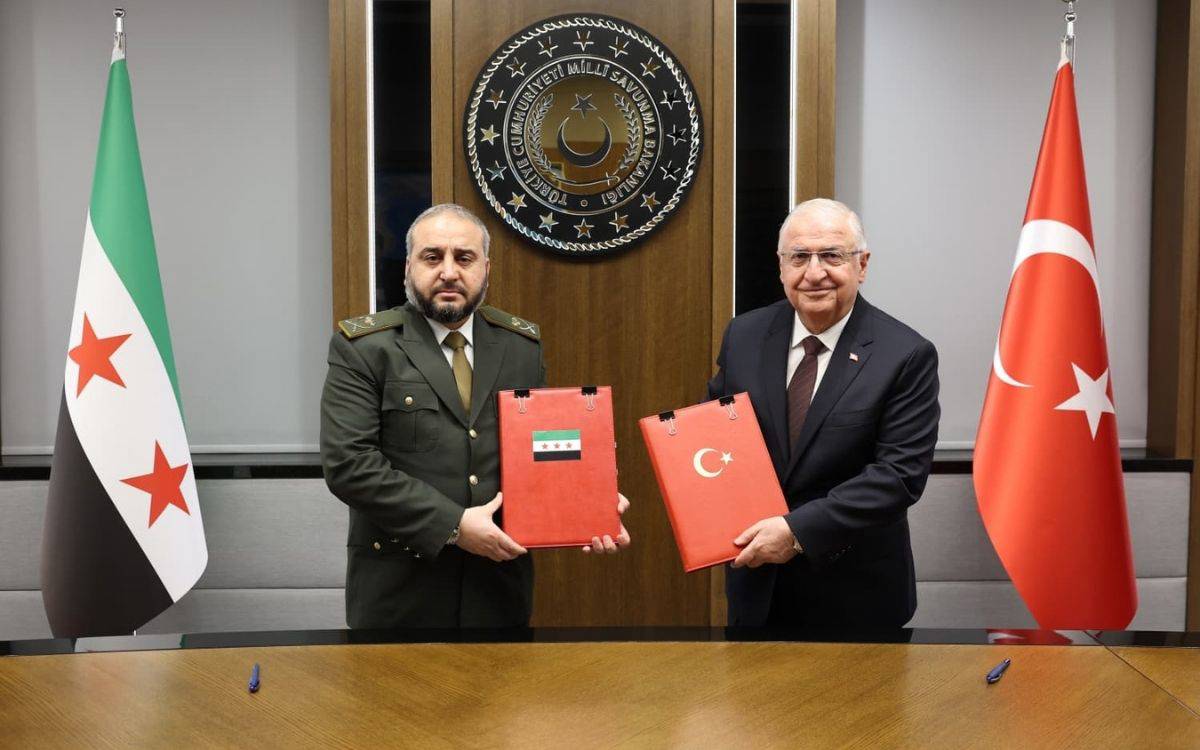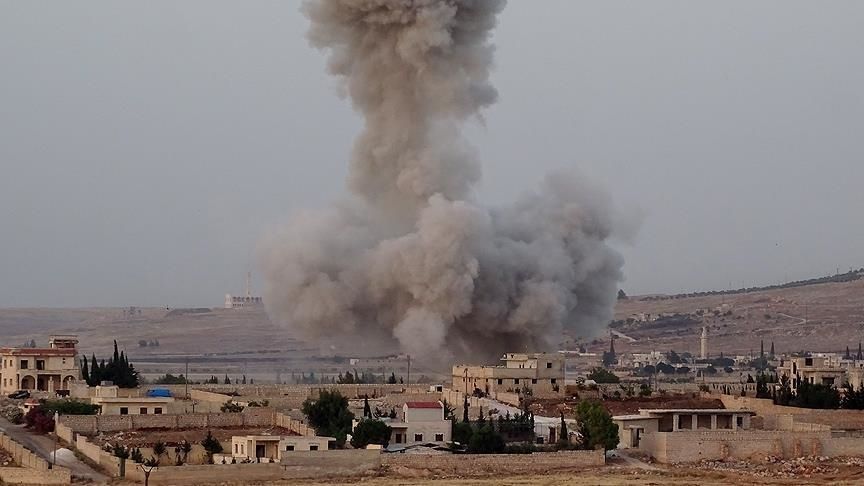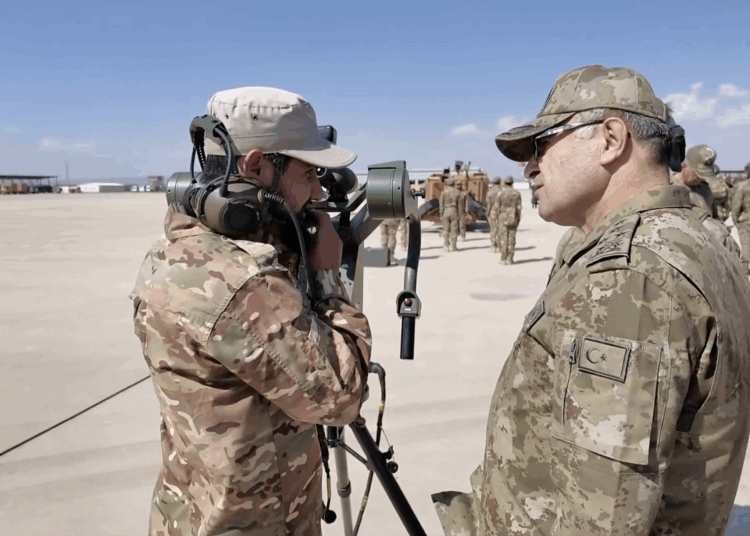Levent Kenez/Stockholm
Turkey has begun providing formal air defense instruction to Syrian army personnel as part of a broader military cooperation framework agreed between Ankara and Damascus earlier this year, according to Turkish defense officials.
During a September inspection visit to units of the Second Army in Gaziantep, Land Forces Commander Gen. Metin Tokel confirmed that Syrian soldiers were receiving training from Turkish instructors on a modernized 35 mm towed air defense gun system. Visuals released by the Turkish military showed Syrian personnel operating the equipment under supervision and attending technical briefings. The training marks one of the first publicly acknowledged joint activities since the two countries moved to formalize their military cooperation in August.
The equipment used in the instruction was developed by Turkey’s defense electronics contractor Aselsan. While technical details highlighted by defense industry outlets noted radar integration and programmable ammunition, Turkish officials emphasized the training’s primary goal as ensuring safe and effective operation by Syrian crews. The decision to feature this system in the early phase of cooperation illustrates Ankara’s focus on providing short-range air defense skills, a capability gap often emphasized in discussions of Syrian military readiness.

This air defense training is part of a wider package of programs agreed in the summer of 2025. Turkish sources have described the agreement as including commitments for the transfer of select weapons systems, logistical support and a structured set of educational exchanges. Reports stated that Ankara would open its training institutions to Syrian officers and noncommissioned officers with plans under discussion for new military schools to be established on Syrian soil with Turkish guidance. The scope includes both operational units and military education, reflecting an ambition to influence not just equipment use but also institutional development.
In the field Turkish forces have already been providing instruction beyond air defense. Training modules in commando tactics, infantry maneuvers and basic combined-arms cooperation have been cited in open-source accounts of the cooperation framework. These programs are reported to follow the same curricula employed within the Turkish Armed Forces, with Syrian personnel undergoing extended periods of classroom learning and field exercises. According to Turkish media, some participants have been hosted inside Turkey to complete courses, while others receive instruction in controlled facilities near the border.
The cooperation also encompasses military engineering, logistics and ordnance disposal. Observers familiar with the content of the accord have said Turkey is expected to provide guidance on maintenance and sustainment including training in the servicing of armored vehicles and artillery systems. De-mining and explosive ordnance disposal modules are understood to be included as well, addressing challenges that persist in areas of Syria where unexploded munitions remain a threat to both military personnel and civilians.
Another area underlined in reports is the provision of technical advisory teams. These teams are tasked with assisting Syrian command structures in planning, organization and operational readiness. While details remain limited, sources have indicated that Turkish officers have been assigned to consult on staff processes, unit reorganization and the integration of intelligence into operational planning. These advisory roles echo previous Turkish experiences in restructuring and training foreign military units in other contexts.
The agreement also outlines cooperation in establishing or modernizing educational institutions for Syrian personnel. Proposals under review include the foundation of officer academies and noncommissioned officer schools modeled on Turkish standards. In the interim selected Syrian candidates are expected to attend Turkish academies directly. Analysts note that this element of the program is significant because it extends beyond immediate tactical training to influence the long-term professional development of Syrian troops.

Equipment support is another component. While neither government has disclosed precise lists of what will be transferred, Turkish reporting indicates that systems to be delivered will come with corresponding operators and training as needed. This reflects a deliberate policy of coupling hardware provision with structured training, ensuring that equipment supplied is operationally viable and sustainable. Sources in the Turkish defense industry have described this approach as a standard practice to avoid dependence and to build local capacity.
The initial focus on air defense fits within this larger framework. By starting with a system that is defensive in nature and already in Turkish service, Ankara has signaled both its willingness to share expertise and its intention to address a critical vulnerability in Syria’s current force posture. At the same time by embedding this activity within a broader series of training and institutional reforms, Turkish officials appear to be framing the cooperation as comprehensive capacity-building rather than isolated equipment transfers.
The program reflects a structured partnership: hands-on technical training, tactical instruction, logistical and engineering support, institutional development through military education and the provision of equipment tied directly to training. The appearance of Syrian soldiers working with Turkish instructors underlines the practical application of the agreement and signals a deepening of formal defense relations.

The military rapprochement between Turkey and Syria has not gone unnoticed in the region. Israel, which has carried out repeated airstrikes in Syrian territory, is closely monitoring the cooperation. On September 9,2025 Israeli aircraft struck targets in Homs, Latakia and Palmyra on the same day that Ankara hosted the commander of the Syrian Air Force. The timing of the operation was widely interpreted in regional media as a signal directed toward Turkey. Israeli sources claimed the raids destroyed missile and air defense assets of Turkish origin stationed at the targeted bases. The Turkish Ministry of Defense denied those assertions, stating that the attack had no impact on Turkish units deployed in Syria and affirming that Ankara would continue training Syrian forces under the August 13 bilateral agreement.
Turkish outlets also reported claims that Israeli strikes sought to damage intelligence and surveillance equipment operated by Turkey’s National Intelligence Organization (MİT), although no confirmation was provided by Ankara. Earlier this year, in March and April, Israel conducted additional air raids against the T4 air base in central Syria, a location described as strategically important because it connects by road to major cities such as Homs and Damascus and serves as a hub for logistics operations.












